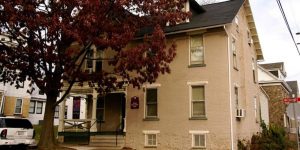In 1970, it was a white wooden house on the east end of the Quad. In 1989, it was a brick house on McCartney Street. With today’s plans of growing enrollment and expanding campus, the Portlock Black Cultural Center is also in the midst of its next evolution.
The focus at the center has changed over the last 40 years. Today, it welcomes students of all backgrounds who are seeking cross-cultural dialogue and friendship. But no matter who crosses the threshold, one word unites them: home.
 “It is the one place on campus that connects generations of people at Lafayette,” says Maurice Bennett ’06 and former associate trustee to the Lafayette board. “It touches them at a deep emotional center.”
“It is the one place on campus that connects generations of people at Lafayette,” says Maurice Bennett ’06 and former associate trustee to the Lafayette board. “It touches them at a deep emotional center.”
Which is why planning the next chapter in the Portlock Center’s history is crucial.
Adrienne McKinney, owner of ALMA architecture, leads the design for this project. Her firm is in an active listening stage for the Portlock Center, having met with members of the McDonogh Network and surveyed students and alumni.
“There’s a real opportunity for the Portlock Center to look to the future,” says McKinney.
The current building includes the Aaron O. Hoff Library, which doubles as a meeting space, Riley Temple Gallery, a lounge, and a residence for three students.
Space planning is important, but so much more is at stake.
“This place is a home away from home,” says Bennett. “As such, being there makes you feel as close to who you are as you’re going to find on campus. Students can relax, talk issues, bring struggles, get comfortable, and feel safe.”
“As the campus footprint evolves–, we have to make it feel like home and honor the story of all the students who came before us,” says Bennett. “Despite having touched multiple generations, I feel strongly that we can and will reach a consensus regarding the future of Portlock. Therefore, I would encourage all of our passionate alumni to make their voices heard because we are all committed to its future.”
Bennett asks alumni to reach out to him and other members of the McDonogh Network to be sure their voice is heard during the listening phase of planning. Feedback can also be directed to Robert Young ’14 Associate Director of Annual Giving and McDonogh Network liaison at youngr@lafayette.edu.
Only then will the next iteration of the Portlock Center be able to educate students on its history and welcome them to a home away from home.
 “It is the one place on campus that connects generations of people at Lafayette,” says Maurice Bennett ’06 and former associate trustee to the Lafayette board. “It touches them at a deep emotional center.”
“It is the one place on campus that connects generations of people at Lafayette,” says Maurice Bennett ’06 and former associate trustee to the Lafayette board. “It touches them at a deep emotional center.”